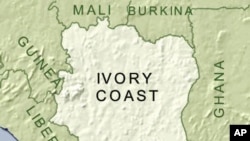Ivory Coast's former rebels say they will disarm one month before presidential elections, in accordance with the country's peace agreements.
Ivory Coast's ruling party says the delay in rebel disarmament is holding up the organization of a presidential poll that has been postponed eight times since civil war cut the country in half in 2002.
Ivory Coast's former rebel faction, the New Forces, responded Monday that disarmament has never been a precondition for organizing elections.
Spokeswoman for the New Forces, Affousy Bamba, says the war is over and insisting on disarmament before organizing elections is a step backwards.
Bamba called for an end to recent attacks by the presidential camp on the New Forces, who continue to control the northern part of the country. She said these accusations are "counterproductive" to the peace process.
Bamba said the process of disarmament for rebels will begin one month before the poll date, as prescribed by the Ouagadougou peace accords. She said those agreements also require militias loyal to the president to begin disarming two months before the vote.
In Monday's statement, the New Forces said that of the approximately 20,000 soldiers yet to be disarmed or reintegrated into Ivorian society, 5,000 will be kept on to help secure the polls on election day. The disarmament process will finish after the elections.
The U.N. Security Council expressed concern last week at continuing electoral delays in Ivory Coast.
The most recent setback came after President Laurent Gbagbo dissolved the government and electoral commission on February 12th, sparking violent protests around the country. Mr. Gbagbo had accused the electoral commission of illegally registering as many as 400,000 foreigners.
Mr. Gbagbo's political opponents accuse him of stalling elections to remain in power, though his supporters deny these allegations.
A new electoral commission was put in place in late February, but has yet to propose a new electoral timeline or new poll date.
Of the more than six-million names on the provisional voter list, the eligibility of one-million voters is still being disputed, mainly on the grounds of nationality. Progress towards the definitive voter list has been slow, and observers fear that holding a poll in May is impossible.









